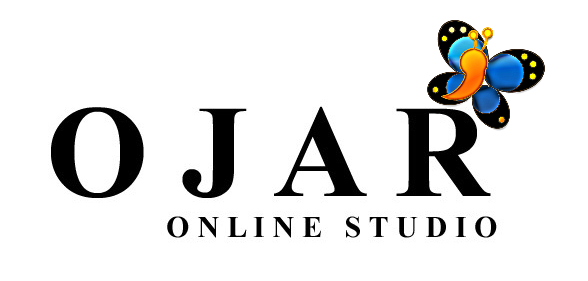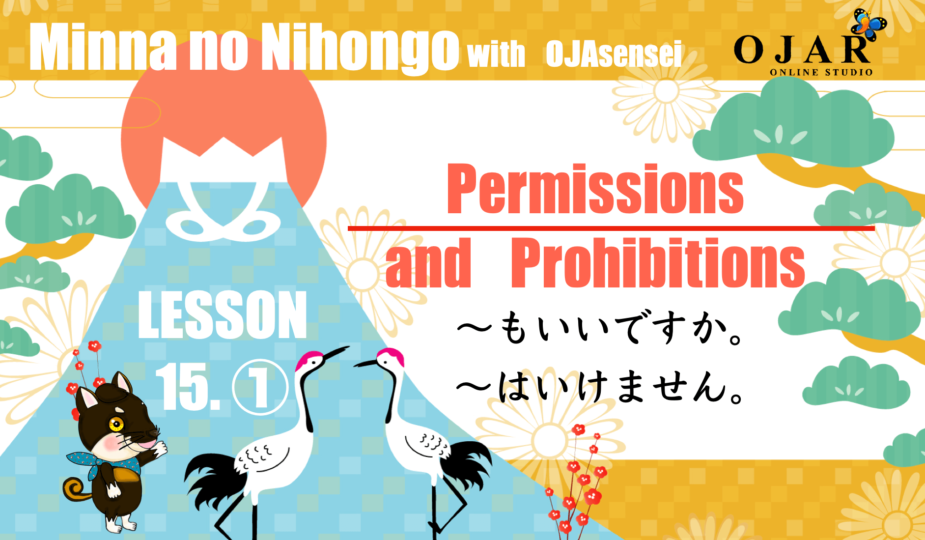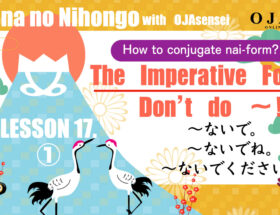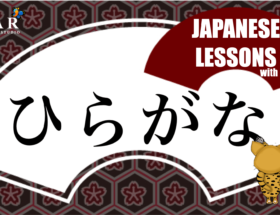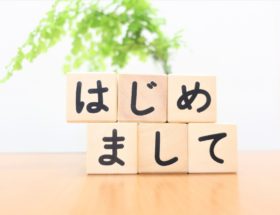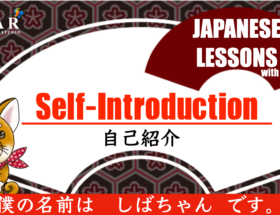こんにちは、みなさん おじゃちゃんです。
Today is “Minna no Nihongo lesson 15 ① : Asking for Permissions in Japanese”. Asking for permissions and expressing prohibitions differ from the situations or the people. You want to use them correctly because that would determine your impression, don’t you? Let’s learn these expressions together with te-form I taught in previous lessons together.
Let’s get started!
Minna No Nihongo: Beginner 1, 2nd Edition (Japanese)
Customer Reviews:★★★★☆
Publisher : 3A CORPORATION; 2nd Edition (March 16, 1998)
CONTENTS
■ Asking for Permissions in Japanese
Let’s learn the expressions of asking for permissions.
Casual Expressions | Asking for Permissions
You can use these expressions below when you want to ask for permissions casually to your close people like your friends or family.
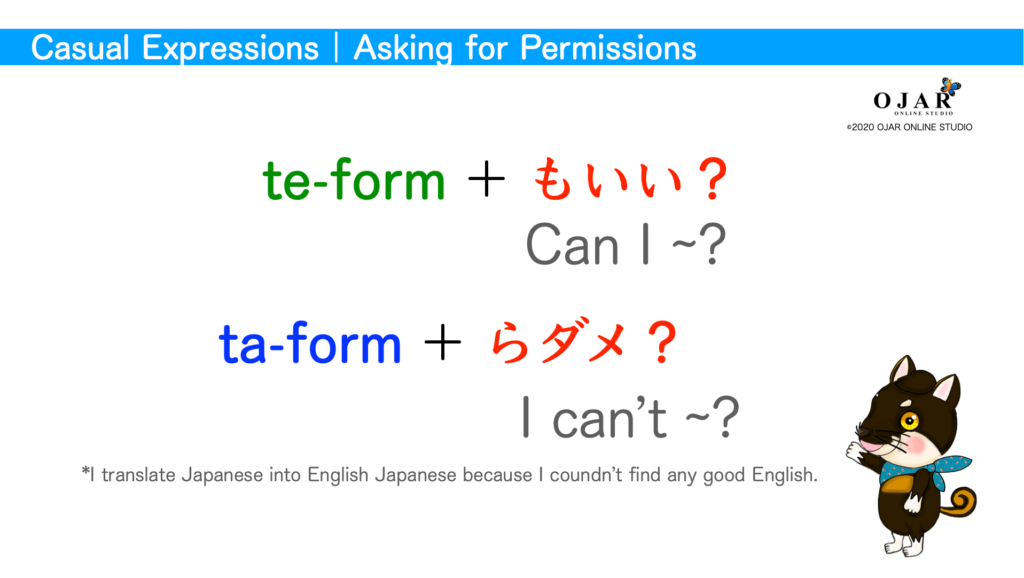
・te-form + もいい? Can I ~?
これ 食べて もいい?
kore tabete moii
Can I eat this?
・ta-form + らダメ? I can’t ~?
これ 取った らダメ?
kore tottara dame
*I can’t take this?
*I translate Japanese into English directly because I couldn’t find good English translations.
Suitable Casual Responses | Asking for Permissions
・Positive Responses
| Japanese | English | Usages |
|---|---|---|
| もちろん。 mochiron | Of course. | when you permit willingly |
| うん、いいよ。 un iiyo | Yeah, sure. | when you accept to do something |
| オッケー。 okkei | Okay. | when you accept to do something casually |
・Negative Responses
| Japanese | English | Usages |
|---|---|---|
| いや、ごめん。 iya gomen | Sorry, no. | when you decline it casually |
| ちょっと困る。 chotto komaru | Ah I’m not happy about that. | when you want to say it’s uncomfortable for you |
| いや。 iya | No way. | when you don’t want to do something |
| ダメ。 dame | Not good. | when you oppose the offer |
Polite Expressions | Asking for Permissions
You can use these expressions below when you want to ask for permissions politely to your co-workers or strangers etc.
⭐️’s expressions appear in Minna no Nihongo Lesson 15.
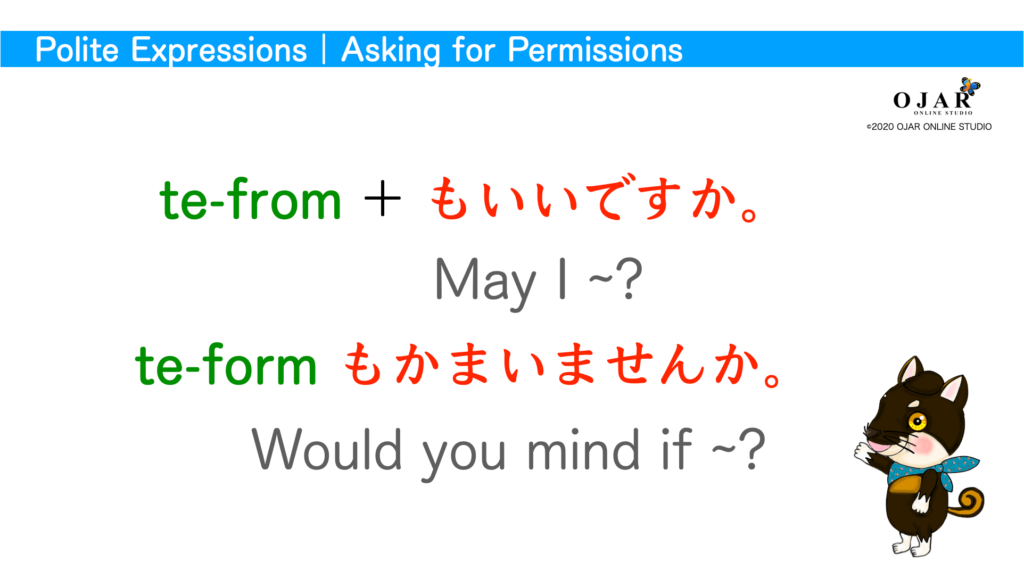
⭐️ te-form + もいいですか。May I ~ ?
お願いして もいいですか。
onegaishite mo iidesuka
May I ask you a favor?
・te-form + もかまいませんか。Would you mind if ~?
この絵を 見て もかまいませんか。
kono e wo mite mo kamaimasenka
Would you mind if I look at this picture?
Suitable Polite Responses | Asking for Permissions
・Positive Responses
| Japanaese | English | Usages |
|---|---|---|
| どうぞ。 douzo | Go ahead. | when you permit it formally |
| いいですよ。 iidesuoyo | Sure. | when you permit it gently |
| はい、大丈夫です。 hai daijoubu desu | It’s ok. | when you allow to do something |
| かまいませんよ。 kamaimasen yo | No problem. | when you let the speaker to do something |
・Negative Responses
| Japanese | English | Usages |
|---|---|---|
| いや、すみません。 iya sumimsen | Ah, I’m sorry. | when you want to decline it formally |
| いや、ごめんなさい。 iya gomennasai | Ah, I’m sorry. | when you want to decline it gently |
| ちょっと困ります。 chotto komarimasu | This will be a problem. | when you make the speaker stop to do something |
| ダメです。 damedesu | No, it’s not okay. | when you banned to do something |
Graceful Polite Phrases for Business | Asking for Permissions
You need to use these graceful polite expressions when you ask for permissions to superior people, elder people, or your clients etc.
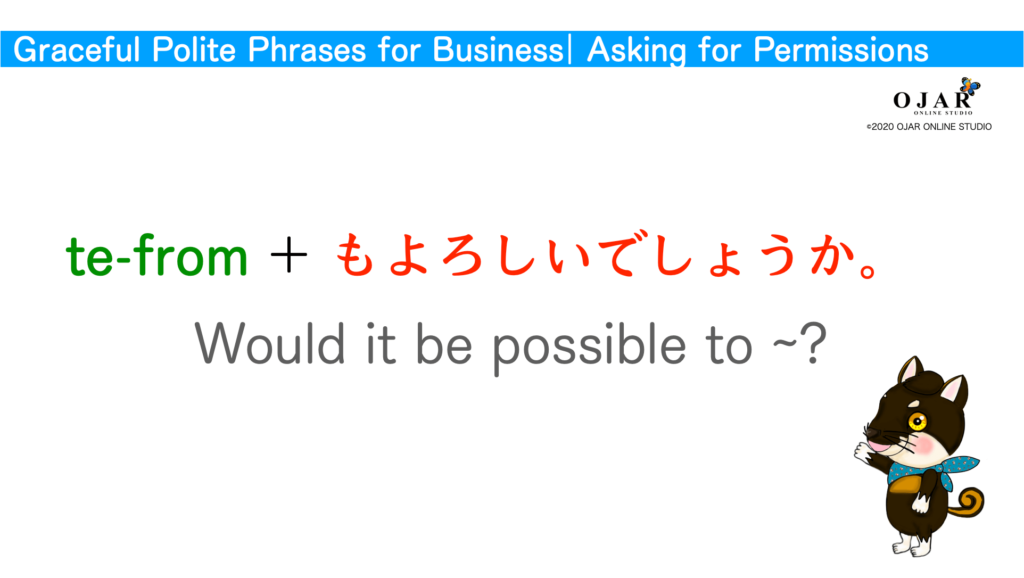
・te-form + もよろしいでしょうか。Would it be possible to ~?
後日 お伺いして もよろしいでしょうか。
gojitsu oukagaishite mo yoroshii deshouka
Would it be possible to come and visit you later?
Suitable Graceful Polite Responses for Business | Asking for Permissions
・Positive Responses
| Japanese | English | Usages |
|---|---|---|
| 遠慮せず、どうぞ。 enryosezu douzo | Don’t hesitate. | when you permit to do something willingly |
| いいですよ。 iidesuyo | Please do. | when you permit to do something gently |
| はい、大丈夫です。 hai daijoubu desu | Yes, you can. | when you allow to do something |
| はい、かまいません。 hai kamaimasen | Don’t worry about it. | when you let the speaker to do something |
・Negative Responses
| Japanese | English | Usages |
|---|---|---|
| すみませんが、難しい [厳しい] です。 sumimasen ga muzukashii [kibishii] desu | I’m sorry but… | when you want to decline in a roundabout |
| 大変 申し訳ありませんが、~。 taihen moushiwakearimasen ga | I’m afraid that ~. | when you want to decline politely on business |
| あいにく、~できません。 ainiku ~ dekimasen | I regret to let you know that ~. | when you decline to do something gently to superior people |
| せっかくですが、お断り 申し上げます。 sekkaku desu ga okotowari moushiagemasu | Unfortunately, I can’t accept your offer. | when you decline to do something to superior people |
■ Expressing Prohibitions in Japanese
You can use these sentences if you don’t want the the listener to do something. Let’s learn how to express prohibitions.
⭐️’s expressions appear in “Minna no Nihongo Lesson 15”.
Casual Expressions | Expressing Prohibitions
You can use these expressions below when you express prohibitions in Japanese casually to your close people like your friends or family.
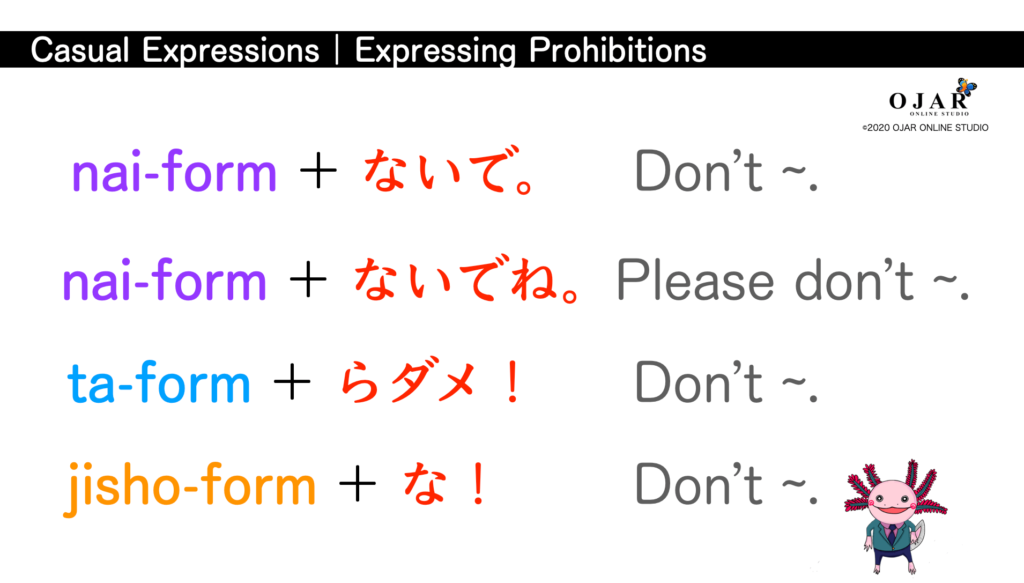
・nai-form + ないで! Don’t ~ !
私の お菓子を 食べないで!
watashi no okashi wo tabenaide
Don’t eat my candy.
・nai-form + ないでね。Please don’t ~.
今度は 遅れないでね。
kondo wa okurenaide ne
Please don’t be late next time.
When you add “ね” at the end of the sentence, you can express something gently.
・ta-form + らダメ!Don’t ~ !
開けたら ダメ!
aketara dame
Don’t open it!
・jisho-form + な! Don’t ~ !
寝るな!
neruna
Don’t sleep!
Suitable Casual Responses | Expressing Prohibitions
・Positive Responses
| Japanese | English | Usages |
|---|---|---|
| はい。 hai | Yes. | when you agree |
| 分かった。 wakatta | I see. | when you accept casually |
・Negative Responses
| Japanese | English | Usages |
|---|---|---|
| いやだ。 iyada | No. | when you don’t want to do definitely |
| やだよ。 yadayo | No. | when you notice the listener not wanting to do |
| 知るか。 shiruka | I don’t care. | when you want to ignore to do |
Polite Expressions | Expressing Prohibitions
You can use these expressions below when you express prohibitions in Japanese politely to your co-workers or strangers etc.
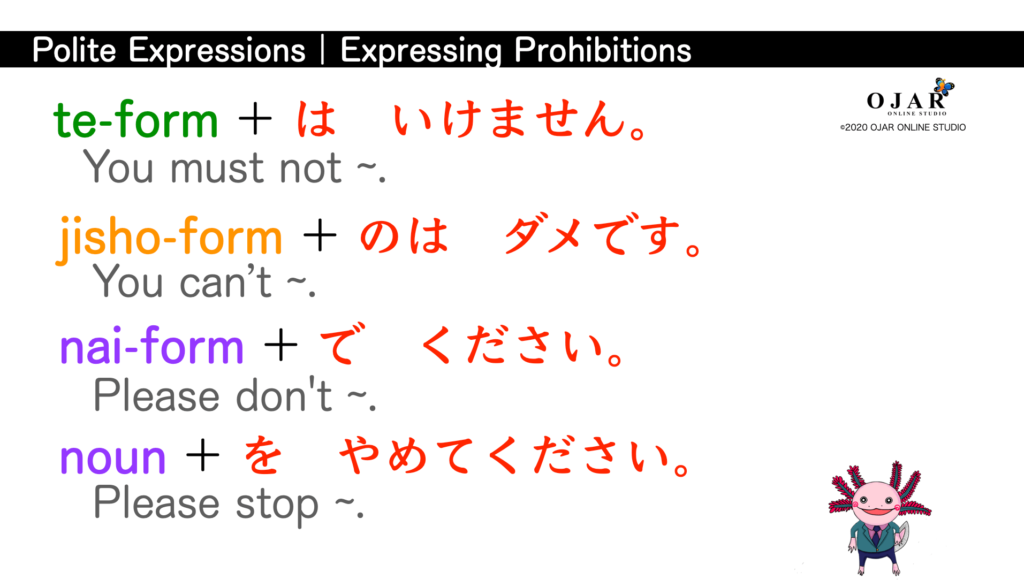
⭐️ te-form + は いけません。 You must not ~.
ここに 入っては いけません。
koko ni haitte wa ikemasen
You must not enter here.
・jisho-form + のは ダメです。You can’t ~.
これに 触るのは ダメです。
kore ni sawaru nowa damedesu
You can’t touch this.
・nai-form + で ください。 Please don’t ~.
ここに 座らないで ください。
koko ni suwaranaide kudasai
Please don’t sit here.
・noun + を やめてください。 Please stop ~.
話を やめてください。
hanashi wo yametekudasai
Please stop talking.
Suitable Polite Responses | Expressing Prohibitions
・Positive Responses
| Japanese | English | Usages |
|---|---|---|
| 分かりました。 wakarimashita | I understand. | when you agree it formally |
| すみません。 sumimasen | I’m sorry. | when you apologize for it |
・Negative Responses
| Japanese | English | Usages |
|---|---|---|
| どうしてですか。 doushite desuka | Why? | when you ask of it instead of denying |
| いやです。 iyadesu | No. | when you oppose to do something directly |
Very Polite Phrases for Business | Expressing Prohibitions
You can use these expressions below when you express prohibitions in Japanese superior people, elder people, or your clients etc. That’s very difficult. You can use “Making requests” instead when you prohibit to do something to such people.
You can learn “Making Requests and Asking Suggestions” form HERE!
・noun + は お控えください。 I must ask you to refrain from ~.
こちらでの 飲食は お控えください。
kochira deno inshoku wa ohikae kudasai
I must ask you to refrain from eating here.
・noun + は ご遠慮ください。 You are requested to refrain from ~.
写真撮影は ご遠慮ください。
shashin satsuei wa goenryo kudasai
You are requested to refrain from taking pictures.
・noun + は ご遠慮いただけますか。 Could you please not do ~.
携帯電話の 利用は ご遠慮いただけますか。
keitaidenwa no riyou wa goenryo itadakemasuka
Could you please not use your phone?
Suitable Very Polite Phrases Responses for Business | Expressing Prohibitions
・Positive Responses
| Japanese | English | Usages |
|---|---|---|
| 失礼致しました。 shitsurei itashimashita | I’m sorry for that. | when you apologize politely |
| 承知致しました。 shouchi itashimasita | I understand. | when you use on business |
| かしこまりました。 kashikomarimashita | Certainly. | when you use it for superior people |
・Negative Responses
| Japanese | English | Usages |
|---|---|---|
| 恐れながら、お断り申し上げます。 osorenagara okotowari moushiagemasu | I’m afraid that I will have to decline. | when you decline it politely and directly |
| 恐れながら、理由を 聞かせて いただけますか。 osorenagara riyuu wo kikasete itadake masuka | If you don’t mind I’d like to hear the reasons. | when you ask the reasons instead of declining gently |
■ Permissions and Prohibitions QUIZ
■ Homework
Here is your homework today. Please translate Japanese into English and comment below.
1.帰っても いいですか。
2.ドアを 閉めないで ください。
Okay, that’s all for today!
Good luck with your Japanese study 🐶🍀
Minna No Nihongo: Beginner 1, 2nd Edition (Japanese)
Customer Reviews:★★★★☆
Publisher : 3A CORPORATION; 2nd Edition (March 16, 1998)
THE NEXT LESSON is:
Minna no Nihongo 15 ②:The Progressive Present Form te-form + imasu
THE PREVIOUS LESSON is:
Minna no Nihongo 14: Making Requests and Suggestions
